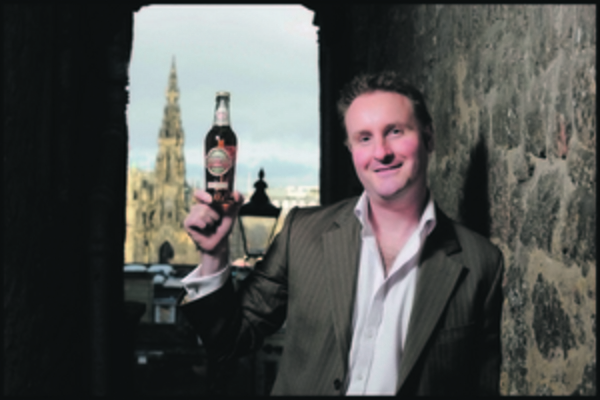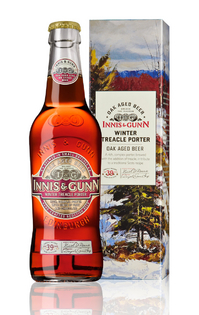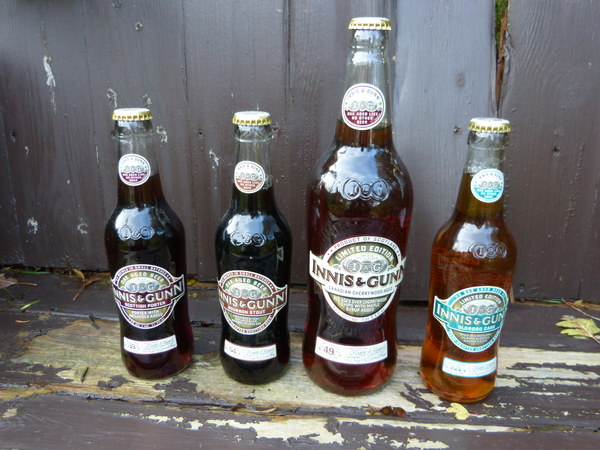Dougal Sharp, the man who kick-started oak-aged beer revolution, celebrates 10 years of success
Added: Wednesday, November 13th 2013

Dougal Sharp didn’t expect to celebrate 10 years of Innis & Gunn in a swanky hall in September with the great and good of Edinburgh feting him, and with 1.4 million cases of beer sold in 2013.
His success is a Scottish version of the American Dream. He started in a two-bedroom flat in the city, using a printer rescued from a builders’ skip. Today the company has a staff of 40 housed in Georgian splendour in Edinburgh’s West End.
During that 10-year period, Dougal has not only turned Innis & Gunn (I&G) into one of Scotland’s most successful companies but he has also inspired brewers in Britain and other countries to age beer in wood. Oak-aged beer is now the buzz term in breweries in the United States, Belgium and Italy, with experiments going on in Australia and New Zealand.
And the driving force has been Innis & Gunn’s Original, matured in bourbon barrels. Before the advent of metal beer casks in the 1920s, beer was routinely stored in oak containers. But with few exceptions the casks were lined to avoid the beer coming into contact with the wood and picking up oaky flavours and aromas, considered to be undesirable
Dougal has transformed the way beer is stored. As a result of his work, brewers are ageing beer in bourbon, whisky, cognac, rum and wine barrels. All manner of new and exciting descriptions have entered the lexicon, with writers talking of vanilla, caramel, oak, pine, vine and whisky notes.
And it all came about by accident. Dougal was head brewer at the Caledonian Brewery in Edinburgh where he worked alongside his father Russell Sharp, who had rescued the brewery from closure in the late 1980s. Russell had previously worked for Chivas Regal in the whisky industry where he had made a close study of wood ageing. As a result, the Sharps were keen to help whisky distiller William Grant – world-famous for Glenfiddich single malt -- when it asked Caledonian for a batch of beer.
Grants was developing a new range called Cask Reserve Scotch Whisky and it wanted beer to age some of the casks. The plan was to dispose of the beer once ageing was complete. But Dougal was intrigued to receive a phone call from the distiller saying its workers, instead of pouring the beer away, had drunk it and found it delicious.
On a wing and a prayer, Dougal gave up his well-paid, full-time job at Caledonian and launched Innis & Gunn, using his and his brother’s middle names. His first beer, Original (6.6%), was matured in lightly-toasted American oak casks bought from bourbon whiskey producers. Scotch single malt whisky makers use either bourbon or sherry casks to age their whiskies and Dougal was flying in the face of the received wisdom that American oak has so many bold, assertive, woody and tannic flavours that they would overpower the delicate character of beer.
His beer, brewed first at Belhaven Brewery in Dunbar and now at Wellpark in Glasgow, is made with pale malt, a touch of roast barley for colour, and is hopped with Super Styrians. The beer enjoys a 77-maturation period, 10 times the average for ale. This includes a 30-day rest period in American white oak casks.

American law decrees that casks used to make bourbon whiskey can be used once only. The casks are broken up and the staves are sent to Scotland and reassembled. Maturation takes place at William Grant’s distillery at Girvan on the Ayrshire coast.
The finished beer had a wholly new aroma and palate. As well as contributions from malt and hops, the casks add oak, smoke and whisky notes as well as vanilla, derived from vanillin, a compound found in wood.
Dougal sold 41,000 cases of beer in the first six months of starting the business. “The first order came from Belhaven,” he says, “then from bars in Edinburgh. Safeway ordered 120 cases, Sainsbury’s followed suit and then sales just took off. I made a loss in 2003 but I was in profit the following year.”
Today 75% of I&G sales come from exports. Dougal puts this down to the interest shown in the beer in Sweden in the early days. “Buyers from Sweden came to see me and as a result 90 state shops took Original. It sold like hot cakes.”
In Sweden all beers above 3.5% can be sold only in government liquor stores, the Systembolaget. Dougal explains that if a brewery performs well in selected stores, its beer then move up a division and more stores can order it. Today all 422 Systembolaget outlets take both Original and Rum Cask beers and they’re the biggest imported brands in the country.
“The Swedes are deeply interested in how the beers are brewed and the ingredients we use,” Dougal says.
His entry into North America came through Canada, another highly-regulated market for alcohol. “The biggest distributor of beer in the country took 600 cases of Original as a one-off order,” he says. “It costs three times the price of domestic beer but it flew off the shelves in a week. We know export half a million cases a year to Canada and it’s growing like crazy.”
Following years of negotiations, I&G has broken into the U.S., where every state imposes its own rules and taxes. Today the company has a world-wide spread, selling to Australia, Scandinavia, Ireland and Switzerland.

Original remains the biggest selling, flagship brand but Dougal has added several new beers, using a variety of casks. They include Toasted Oak IPA, Bourbon Stout, Canadian Cherrywood with maple syrup, Scottish Porter, Treacle Porter. Oloroso Cask, Irish Whiskey Cask and Rum Finish.
To taste and watch the oak-ageing process, I went with Dougal Sharp to William Grant’s large distillery at Girvan, close to Turnberry golf course. The site is vast and is packed inside and out with oak casks, as by law even blended Scotch whisky has to be stored in wood. The distillery industry is one of the last to employ coopers and en route to tasting beer we watched skilled craftsmen shaping, assembling and firing oak casks.
In the corner of one enormous store house, we found a batch of oak casks where Irish Whiskey Cask was maturing. The casks came originally from Jim Beam’s bourbon distillery in Kentucky and were then used by an Irish whiskey distiller.
A Grant’s employee tapped one of the casks and handed us small tasting glasses of the beer, which is a Scottish-brewed stout infused with the aromas and flavours of Irish whiskey. A young beer was amazingly complex, with herbal, spicy hop notes, roasted grain, espresso coffee, oak, smoke, bitter chocolate and vanilla on nose and palate, with a warming hit of whisky. A beer that had matured for longer had more oak on the nose, with greater hop bitterness and a burnt fruit note, with a solid backbone of honeyed whiskey. The 7.4% beer is matured in cask for 60 days. It’s brewed with lager malt, 10% wheat, crystal and chocolate malts, with roasted barley. A single hop is the English Fuggle.
As a result of the high demand for Oiginal and a shortage of bourbon casks, Dougal has changed the way the beer is matured. At Wellpark, the beer is filtered through a vessel like a giant coffee percolator, packed with oak chips. This is similar to the way oak-aged Chardonnay is made. The beer that emerges from this process is blended with beer that has been aged in bourbon barrels.
Dougal defends his use of contract breweries, first Belhaven and now Wellpark. “I first brewed at Caledonian and grew production there from 20,000 barrels to 100,000 barrels a year. Deuchar’s became one of the most successful IPAs in the UK,” he points out.
“But I had to rebuild the brewery after two fires. That put me off owning a brewery. The current model works – out-sourcing is a strength, not a weakness. I will have my own brewery one day – it may be three, five or 10 years but it will happen.”
At present his effort is going in to building his on-trade business in the UK. He has two draught beers, Lager at 4.6% and Original at 6.6%.
“The draught Lager is a more sessionable ale,” he says. “We have 100 draught taps, mainly in Scotland, and I want to develop sales throughout the UK.”
He plans more special edition and seasonal beers. He has produced IPA in cask form for Wetherspoon’s beer festival and promises a bottle-conditioned beer in 2014, which will please CAMRA, not always his greatest supporter, though he has nothing but praise for the campaign.
He allows himself – briefly – to rest in the glow of the 10th anniversary celebrations. But as the man who kick-started the oak-aged revolution, he has a world-wide demand to satisfy.
And the second-hand printer is back in the builders’ skip.
*Innis & Gunn was given the Queen’s Award for Enterprise in International Trade in 2010 and 2013. It was given the Outstanding Small Business Award in 2013 by the Institute of Grocery Distribution. The company has won in three successive years Gold medals for Oak Aged Beer in the Monde Séléction competition and two Golds for Rum Finish.




